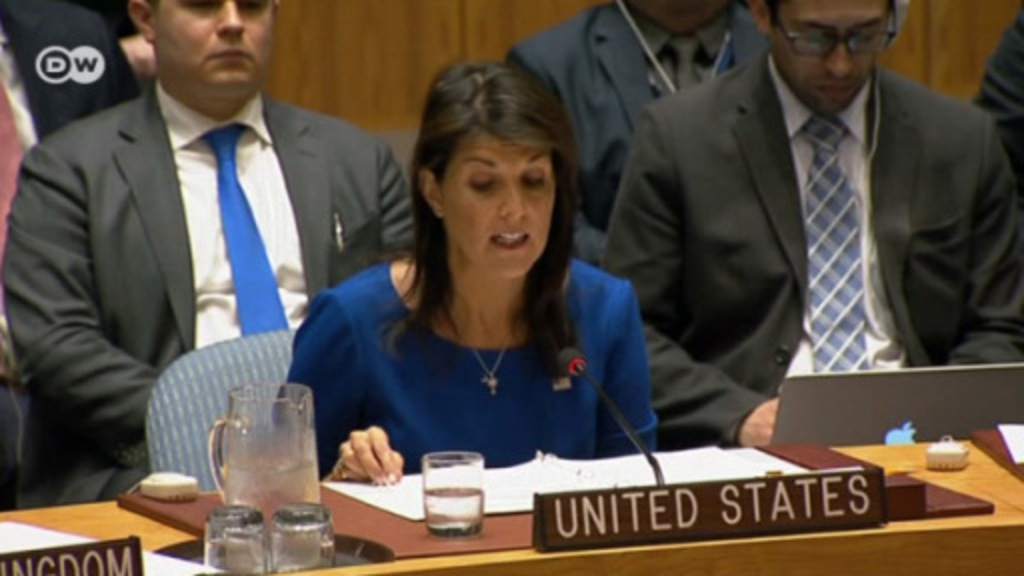News
Syria: Trump still favors timely withdrawal despite Macron assurances of longterm engagement
The US is to leave Syria "as soon as possible," the White House has said. The comment came just hours after the French president claimed he had convinced Trump otherwise in a major TV interview.
Following Saturday's airstrikes on targets in Syria by the US, the UK and France, the White House said late on Sunday that the US strategy in Syria had not changed and that it wants US troops home "as soon as possible," according to Press Secretary Sarah Sanders.
The comments came just hours after French President Emmanuel Macron – who has been vocal in pushing for constructive relations between western Europe and Trump - said in a major interview on French television that he had convinced his US counterpart to stay in Syria "longterm."
What the White House said:
- "The US mission has not changed, the president has been clear that he wants US forces to come home as quickly as possible," Sanders said in a statement.
- "We are determined to completely crush ISIS [Islamic State] and create the conditions that will prevent its return.
- "In addition, we expect our regional allies and partners to take greater responsibility both militarily and financially for securing the region."
What Macron said:
- In a televised interview held to mark a year as president, he told reporters that "I assure you, we have convinced him [Trump] to stay longterm" in Syria.
- He also said he had stressed to the US that airstrikes in Syria had to be limited to attacking chemical weapons facilities.
- Macron repeatedly emphasized that France, the US and the UK were the three members of the UN Security Council taking the lead in tackling the Syria conflict together.
Read more: Airstrikes in Syria: What you need to know
Embarrassment for Macron: The fact that the US so quickly contradicted his comments on Syria, casts some doubt on the US-French relations. Last year, when attending the Bastille Day celebrations in Paris, Trump spoke of his "unbreakable friendship" with Macron and Macron said of the US: "Nothing will ever separate us."
Pulling out all the stops at the annual holiday and displaying France's military might, Macron attempted to show that France is back on the international stage, ready to stand shoulder to shoulder with the US, in particular.
Read more: Is Emmanuel Macron Europe's new Angela Merkel?
'Surrender monkeys' no more: In Sunday night's TV interview, the French president repeatedly talked of France's leading role in Syria and on the international stage generally.
A far cry from the "cheese-eating surrender monkeys," a term first coined by "The Simpsons" and later often used in the US to describe the French for opposing the Iraq War in 2003, Macron said Sunday that "France debates, France is convincing," explaining that his country is determined to talk to anyone and take a leading role within the framework of international organizations like the UN.
Joint airstrikes: On April 14, the US, the UK and France launched precision airstrikes on three sites in Syria; near the capital Damascus and Homs that were allegedly used for developing and testing chemical weapons.
Chemical attacks: Syria's Bashar Assad has been accused of repeatedly using chemical weapons in the Syrian civil war; most recently on April 7. Syria and Russia, a key ally of Assad, have both denied the use of chemical weapons. Russia even accused the UK of helping to stage the attack.
Macron to visit Trump: The French president is scheduled to travel to Washington on April 24. It will be the first state visit - the highest expression of friendly bilateral relations - since Trump took office in January 2017.
ng/rt (dpa, AFP)
DW recommends
Audios and videos on the topic
- Date 16.04.2018
- Related Subjects Syria, Donald Trump, French presidential election 2017, Emmanuel Macron
- Keywords Syria, Donald Trump, Emmanuel Macron, Bashar Assad, airstrikes
- Share Send Facebook Twitter Google+ More
- Feedback: Send us your feedback.
- Print Print this page
- Permalink http://p.dw.com/p/2w6O2
- Date 16.04.2018
- Related Subjects Syria, Donald Trump, French presidential election 2017, Emmanuel Macron
- Keywords Syria, Donald Trump, Emmanuel Macron, Bashar Assad, airstrikes
- Share Send Facebook Twitter Google+ More
- Send us your feedback.
- Print Print this page
- Permalink http://p.dw.com/p/2w6O2



















